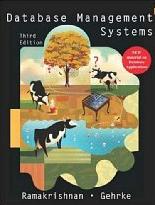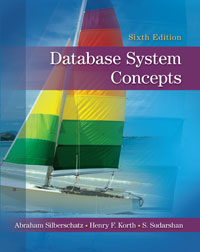BIL344 - DATABASE SYSTEMS
2024 Spring
Course Description
The main objective of this course is to provide students with an in-depth understanding of the concepts and techniques of database systems. The topics include history and motivation for database systems, components of database systems, database architecture and data independence, the relational model, mapping conceptual schema to a relational schema, referential integrity, relational algebra and relational calculus, database query languages (SQL), database design, functional dependency and normal forms, transaction management, and query evaluation.
Attendance:
A minimum of 70% attendance to the lecture
and laboratory hours is compulsory. Violation of this rule will result in an
F2 grade.
Download 1-page version of the course syllabus

Instructor: Mustafa Sert
Assistant: Begum Erkal, Elif Nur Haner, Halise Nur Aydin
Grading Policy
Main and Recommended Texts


Resources
We will be using the following CASE tool for modeling issues through the course:

Başkent University is provided with the use of VP for educational purpose by the Academic Partner Program from Visual Paradigm.
Download and install VP from [BIL344@oys.baskent.edu.tr]
Weekly Course Schedule
| You can download lecture slides from [HERE] | |||
| Week | Topic | LAB/HW Schedule |
Resources (Use the BIL344@OYS for detailed and updated version of this schedule..) |
| 1 | Introduction to database systems concepts and principles | Follow the BIL344@OYS for details.. | |
| 2 | Entity Relationship (ER) and Enhanced ER Model | LAB1:
database design (EER) HW1: You will be given a database design problem |
|
| 3 | Relational Data Model and Integrity Constraints | LAB2: SQL-DDL (CRUD operations) | |
| 4 | Relational Algebra | LAB3: SQL-DML (data insert, update, delete, data loading) | |
| 5 | Structured Query Language (SQL) – DDL subset of SQL | LAB4: SQL-DML (basic select queries) | |
| 6 | Structured Query Language (SQL) – DML subset of SQL | LAB5: SQL-DML (select queries w/joins) | |
| 7 | View, Triggers, Stored Procedures | LAB6: SQL-DML (select queries w/group-by/having/aggregate operators ) | |
| 8 | Midterm Exam Week (subject to change according to Faculty regulations) | ||
| 9 | Dependency theory and normalization | LAB QUIZ: SQL DDL&DML | |
| 10 | Normal Forms and decomposition | LAB7: Views
& Triggers &
Stored Procedures |
|
| 11 | Storage and file structures | HW2: Programming |
|
| 12 | Indexing | ||
| 13 | Overview of transaction management | ||
| 14 | Course summary | ||
